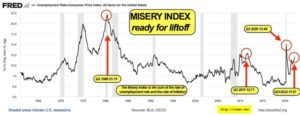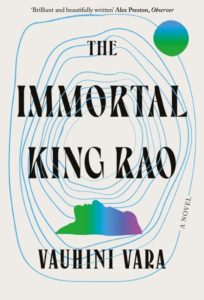The Rising “Misery Index”

Last week, in an attempt to slow the economy without sending it into a recession, the Fed announced the biggest interest rate hike in 28 years. A recession is still likely. But even if we don’t fully enter into one, the outlook is dismal.
As you can see from the above chart, the “misery index” is rising dramatically. What’s the “misery index,” you ask? Developed by economist Arthur Okun in the 1970s, it’s an informal indicator of the economic well-being of a society. The higher the index, the worse the suffering.
The index is calculated by adding the unemployment rate to the inflation rate. A “normal” rate should be between 5.5 and 6.5. That’s based on the Fed’s target inflation rate of 2% and the 3.5% to 4.5% that is generally considered full employment. Right now, it’s closing in on 12.
The Start of a Tough New Economic Climate
You know things are getting tough when The Washington Post is willing to publish an editorial on the economy that makes good sense. Click here.
More About Long-Term COVID
In the June 3 issue, I wondered about the science supporting the existence of Long-Term COVID.
Is it really a medical condition? I was skeptical. And I still am. As I said, there is no empirical evidence that it exists independent of subjective accounts of various symptoms. I find it interesting that, in the past 12 months, JAMA, the CDC, and the European Society of Clinical Microbiology and Infectious Diseases have all reported that women are three times more likely than men to report most physical and all psychological symptoms. And the highest reporting came from men and women with a history of anxiety disorder.
 MarkFord
MarkFord

